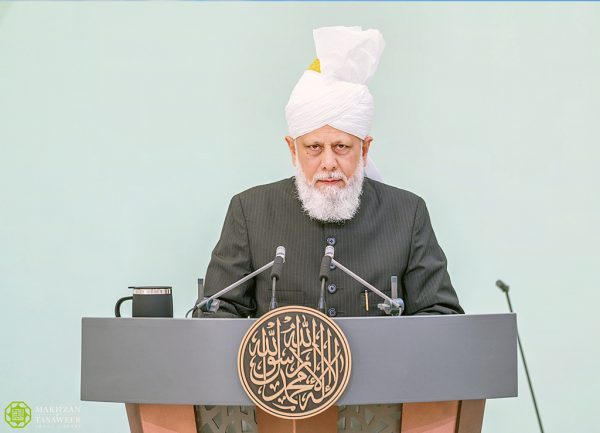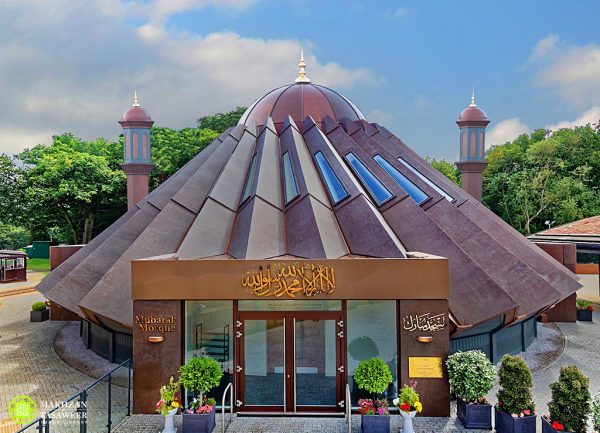
Friday Sermon Summary 26th January 2024: ‘Incidents from the Life of the Holy Prophet (sa) – Events During the Battle of Uhud’
After reciting Tashahhud, Ta‘awwuz and Surah al-Fatihah, His Holiness, Hazrat Mirza Masroor Ahmad (aba) said that he would continue presenting narrations about the injuries sustained by the Holy Prophet (sa) during the Battle of Uhud.

Treating the Wounds of the Holy Prophet (sa)
His Holiness (aba) said that according to one narration, the Holy Prophet (sa) said that God sends His wrath upon a people who injure the face of His prophet. Furthermore, it is recorded that the Holy Prophet (sa) prayed that his people be forgiven because they did not possess understanding. They were perpetrating cruelties because they were foolish and they did not know any better, and the Holy Prophet (sa) prayed that God should not punish them on this account. Such was the immense grace and kindness of the Holy Prophet (sa).
His Holiness (aba) quoted Hazrat Mirza Bashir Ahmad (ra) who writes:
‘Upon reaching the mountain pass, with the assistance of Hadrat ‘Ali (ra), the Holy Prophet (sa) cleaned his wounds. With great difficulty, Abu ‘Ubaidah bin Al-Jarrah (ra) used his teeth to force out the two rings which had sunk deep into the cheek of the Holy Prophet (sa); in this effort, two of his own teeth were broken as well. At the time, the wounds of the Holy Prophet (sa) were bleeding very heavily, and upon seeing this blood, with intense grief the Holy Prophet (sa) said:
“How will such a people prosper who have tainted the countenance of their Prophet with his own blood, only in the crime that he calls them towards God.”
After this, the Holy Prophet (sa) became silent for some time, and then he said:
“O My Allah! Forgive my people, for they have committed this mistake out of ignorance and they know not.”
It is narrated that on this occasion, the following verse was revealed:
“The matter of punishment and forgiveness is in the hand of Allah. You have no concern of this. Allah shall forgive whomsoever He pleases and punish whomsoever He pleases.”
Fatimatuz-Zahra (ra), who had come out of Madinah upon hearing terrible reports regarding the Holy Prophet (sa), also reached Uhud shortly thereafter. As soon as she arrived, she began to wash the wounds of the Holy Prophet (sa), but the bleeding just would not stop. Finally, Hazrat Fatimah (ra) burnt a mat of straw and applied its burnt ashes to the wound of the Holy Prophet (sa). It was only then that his blood was staunched. On this occasion, other women tended to wounded Companions as well and consequently earned spiritual reward.’
(The Life and Character of the Seal of Prophets (sa), Vol. 2, pp. 341-342)
Two Angels Descend in Battle
His Holiness (aba) said that there are also narrations about angels descending and helping in the battle. It is recorded that two men wearing white were seen standing beside the Holy Prophet (sa) fighting in the battle, and these two men had not been seen before. This referred to the angels Gabriel and Mikail. According to another narration, a Companion expressed that some of the disbelievers around him who had been killed in battle were not all killed by him, rather he had the help of someone whom he had never seen before. Another Companion said that the statement of Allah and His Messenger (sa) bore true, that angels would descend and help them in battle.
His Holiness (aba) also quoted the Fourth Caliph (rh), who highlighted these incidents and said that some of the angels wore black turbans, while others wore red. The colour red was a sort of foreshadowing of the grief and loss that would be suffered during this battle. In other words, the injuries endured by the Holy Prophet (sa) during the Battle of Uhud were unlike anything that had ever been experienced before.
Displays of Valiance by the Companions
His Holiness (aba) said that there were also incidents of the Companions who fought valiantly and offered up their lives in order to remain with and protect the Holy Prophet (sa) during the battle. It is recorded that on the day of Uhud, Hazrat Anas bin Nadr (ra) endured more than eighty sword and arrow wounds, and the disbelievers and mutilated his body so severely, that none except his sister was able to identify him by his fingertip. Hazrat Anas (ra) said that the following verse of the Holy Qur’an seemed to have been revealed about him and others who had presented similar sacrifices:
‘Among the believers are men who have been true to the covenant they had made with Allah.’ (The Holy Qur’an, 33:24)
His Holiness (aba) quoted Hazrat Mirza Bashir Ahmad (ra) who writes:
‘At the time, a very dangerous war ensued, and this was a time of great trial and tribulation for the Muslims. As mentioned above, upon hearing news of the martyrdom of the Holy Prophet (sa) many Companions lost their spirit and thrown in their arms and moved to one side of the battlefield. Hadrat ‘Umar (ra) was also among these people. These people were sitting to one side of the battlefield, when a Companion named Anas bin Nadr Ansari (ra) happened to arrive, and upon seeing them, began to say, “What are you doing here?” They responded, “The Holy Prophet (sa) has been martyred. What now, is there to gain from battle?” “This is the very time for battle,” replied Anas (ra) “so that we may also attain the death, which has been acquired by the Holy Prophet (sa); and then what pleasure is there in life after the demise of the Holy Prophet (sa) anyway?”
Then Sa‘d bin Mu‘adh (ra) came before him and Anas (ra) said, “Sa‘d, I can smell the fragrance of paradise from this mountain.” After this, Anas (ra) penetrated the enemy ranks and was martyred in battle. After the war, his body was found to have sustained more than eighty wounds, and no one could recognise his dead body. Finally, his sister identified him by a mark on his finger.’
(The Life and Character of the Seal of Prophets (sa), Vol. 2, p. 337)
His Holiness (aba) said that he would continue narrating these incidents in the future.

An Appeal for Prayers for the Current Situation of the World
His Holiness (aba) said that these days we should keep the Ahmadis of Yemen in our prayers, as they are enduring very difficult circumstances these days. Furthermore, His Holiness (aba) urged prayers for the Muslim world, that may Allah enable them to establish unity and grant them wisdom and understanding. His Holiness (aba) said to pray for the general state of the world, as it hurdles towards a world war; may Allah have mercy.
Funeral Prayers
His Holiness (aba) said that he would offer the funeral prayers in absentia for the following two deceased members:
Dr Hafiz Abdul Hamid Kumanga
Dr Hafiz Abdul Hamid Kumanga who was the National Vice President of the Community in Sierra Leone. He passed away after a short illness on 13 January. He offered the most financial contributions in the Wasiyyat scheme of all the Ahmadis in Sierra Leone. Furthermore, when an appeal for donations was made to purchase a new piece of land for the Annual Convention in Sierra Leone, he presented the largest amount. He had a great deal of love for the Caliphate. His greatest regret was not having the opportunity to meet the Caliph, despite his best attempts at obtaining a visa. He is survived by his wife and two young children, aged four and one.
He would work tirelessly to help his patients. He would recite the Holy Qur’an in a beautiful voice. He was very humble and always met others with a simile. He was regular in offering prayers, keeping fasts and offering financial contributions. He often saw true dreams. He made a ten-year educational plan under the instructions of His Holiness (aba). He was very brave and did not shy away from pointing out something that was wrong. At the same time, he always spoke kindly and gently. His Holiness (aba) prayed that may Allah grant him forgiveness and mercy, elevate his station and may He be the Protector of his wife and children.
Tahira Nazir Begum
Tahira Nazir Begum also known as Tahira Rashiduddin, wife of Chaudhary Rashiduddin, a missionary. Her marriage was announced in the presence of the Second Caliph (ra) who led the silent prayer. She was fortunate to see the Promised Messiah (as) in her dream. She had a strong connection of love with God. She had a personal relationship of love with the Caliphate and she strove to instil the same in her children. She staunchly protected the honour of the Community and could not bear to hear anything negative said about it. She often befriended those women who had a strong connection with God themselves. She also had the honour of going for Hajj. She enjoyed reading books of history. His Holiness (aba) prayed that may Allah grant her forgiveness and mercy and enable her children to carry on the legacy of her virtues.
Summary prepared by The Review of Religions



